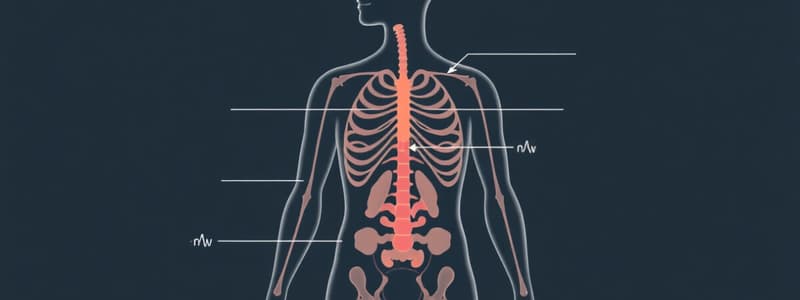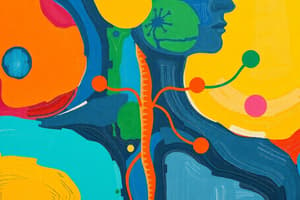Podcast
Questions and Answers
Which hormone is primarily responsible for controlling water balance in the body?
Which hormone is primarily responsible for controlling water balance in the body?
- Cortisol
- Thyrotropin
- Antidiuretic Hormone (ADH) (correct)
- Growth Hormone
What gland is often referred to as the 'master gland' of the body?
What gland is often referred to as the 'master gland' of the body?
- Pituitary Gland (correct)
- Adrenal Gland
- Thyroid Gland
- Pancreas
What is the effect of aldosterone in the body?
What is the effect of aldosterone in the body?
- Stimulates milk production
- Controls sodium and water retention (correct)
- Increases blood calcium levels
- Regulates blood glucose levels
Which hormone is secreted by the hypothalamus to promote the release of cortisol?
Which hormone is secreted by the hypothalamus to promote the release of cortisol?
Which of the following hormones is NOT synthesized by the pituitary gland?
Which of the following hormones is NOT synthesized by the pituitary gland?
What structure connects the pituitary gland to the hypothalamus?
What structure connects the pituitary gland to the hypothalamus?
What is the main function of Antidiuretic Hormone (ADH)?
What is the main function of Antidiuretic Hormone (ADH)?
How many hormones are produced by the anterior pituitary gland?
How many hormones are produced by the anterior pituitary gland?
Where are thyroid hormones synthesized and stored?
Where are thyroid hormones synthesized and stored?
What is the role of inhibiting hormones released by the hypothalamus?
What is the role of inhibiting hormones released by the hypothalamus?
What is the role of calcitonin secreted by parafollicular cells?
What is the role of calcitonin secreted by parafollicular cells?
Which hormone is responsible for increasing uterine contractions during childbirth?
Which hormone is responsible for increasing uterine contractions during childbirth?
What causes the condition known as Diabetes Insipidus?
What causes the condition known as Diabetes Insipidus?
What is the primary function of Prolactin Releasing Hormone?
What is the primary function of Prolactin Releasing Hormone?
Which hormone is responsible for inhibiting both growth hormone and thyroid stimulating hormone?
Which hormone is responsible for inhibiting both growth hormone and thyroid stimulating hormone?
What hormonal condition is characterized by exaggerated bone growth before the closure of the epiphyseal plate?
What hormonal condition is characterized by exaggerated bone growth before the closure of the epiphyseal plate?
Which hormone does not require stimulation from the hypothalamus to be synthesized?
Which hormone does not require stimulation from the hypothalamus to be synthesized?
What is the role of Luteinizing Hormone in the body?
What is the role of Luteinizing Hormone in the body?
Which hormone is also known as the 'stress hormone'?
Which hormone is also known as the 'stress hormone'?
What effect does Thyroid Stimulating Hormone (TSH) have on the thyroid gland?
What effect does Thyroid Stimulating Hormone (TSH) have on the thyroid gland?
Which of the following hormones is directly released in response to stress?
Which of the following hormones is directly released in response to stress?
What is the primary role of the endocrine glands?
What is the primary role of the endocrine glands?
Which stimuli are responsible for the release of hormones related to blood glucose levels?
Which stimuli are responsible for the release of hormones related to blood glucose levels?
What is an example of neural inhibition in the endocrine system?
What is an example of neural inhibition in the endocrine system?
Which hormone is primarily associated with the regulation of blood pressure?
Which hormone is primarily associated with the regulation of blood pressure?
What type of feedback mechanism inhibits hormone release once blood levels are sufficient?
What type of feedback mechanism inhibits hormone release once blood levels are sufficient?
Which of the following is NOT a function of the endocrine system?
Which of the following is NOT a function of the endocrine system?
What is the role of atrial natriuretic peptide in relation to aldosterone?
What is the role of atrial natriuretic peptide in relation to aldosterone?
How does positive feedback affect hormone secretion?
How does positive feedback affect hormone secretion?
What is the primary function of insulin in the body?
What is the primary function of insulin in the body?
Which hormone is primarily responsible for increasing blood glucose levels when they are too low?
Which hormone is primarily responsible for increasing blood glucose levels when they are too low?
How does the body react to increased levels of norepinephrine?
How does the body react to increased levels of norepinephrine?
What characterizes Type 1 diabetes mellitus?
What characterizes Type 1 diabetes mellitus?
Which hormone aids in the development of secondary sex characteristics and is produced mainly in the ovaries?
Which hormone aids in the development of secondary sex characteristics and is produced mainly in the ovaries?
What is the main result of somatostatin's action in the body?
What is the main result of somatostatin's action in the body?
What hormonal effect is associated with pheochromocytoma?
What hormonal effect is associated with pheochromocytoma?
What role does melatonin play in the body?
What role does melatonin play in the body?
Which of the following is a symptom of diabetes mellitus?
Which of the following is a symptom of diabetes mellitus?
What is the primary function of testosterone in males?
What is the primary function of testosterone in males?
Flashcards are hidden until you start studying
Study Notes
Endocrine System Overview
- Endocrine glands are ductless and secrete hormones directly into the bloodstream, targeting distant cells.
- Insulin acts on skeletal organs to utilize glucose for energy.
Stimulation and Inhibition of Hormones
- Humoral Stimuli: Hormone release triggered by blood substance levels; e.g., low calcium increases PTH.
- Neural Stimuli: Nervous system activity causing hormone release; e.g., stress triggers norepinephrine and cortisol.
- Hormonal Stimuli: Hormones from one gland stimulate release from another gland.
Hormonal Inhibition Mechanisms
- Humoral Inhibition: Hormones can release other hormones to inhibit their own secretion; e.g., aldosterone and atrial natriuretic peptide manage blood pressure.
- Neural Inhibition: Neurotransmitters prevent hormone release.
- Hormonal Inhibition: One hormone inhibits another's secretion.
Feedback Mechanisms
- Negative Feedback: Hormone release decreases when desired blood levels are reached.
- Positive Feedback: Hormone secretion increases over time due to continuous stimulation.
Functions of the Endocrine System
- Metabolism regulation (thyroid hormone, cortisol).
- Control of digestion and food intake (insulin).
- Tissue development modulation (growth hormone).
- Ion level regulation (aldosterone, ANP, PTH).
- Water balance management (ADH, aldosterone).
- Blood pressure and heart rate modulation (TH, cortisol).
- Nutrient regulation (insulin, glucagon).
- Control of reproductive functions (androgens, estrogen).
- Uterine contractions and milk release stimulation (oxytocin, prolactin).
- Immune system function modulation (thymosin, cortisol).
Pituitary Gland
- Size: 1 cm in diameter, 0.5-1.0 g in weight; pea-sized and located in sella turcica of the sphenoid bone.
- Divided into anterior (7 hormones) and posterior (2 hormones) lobes, connected to the hypothalamus.
- Synthesizes 9 hormones under hypothalamic control via releasing and inhibiting hormones.
Releasing Hormones from the Hypothalamus
- Growth Hormone Releasing Hormone stimulates growth hormone release.
- Cortisol Releasing Hormone facilitates ACTH release.
- Thyrotropin Releasing Hormone promotes TSH release.
- Prolactin Releasing Hormone stimulates prolactin release.
- Gonadotropin Releasing Hormone triggers LH and FSH release for sexual development.
Inhibiting Hormones
- Growth Hormone Inhibiting Hormone decreases growth hormone release.
- Prolactin Inhibiting Hormone affects prolactin secretion.
- Somatostatin inhibits growth hormone and thyroid-stimulating hormone.
- Dopamine influences prolactin levels and addiction behaviors.
Anterior Pituitary Gland Hormones
- Growth Hormone: Affects multiple tissues; regulates growth and metabolism; issues include giantism, acromegaly, dwarfism.
- Thyroid Stimulating Hormone (TSH): Stimulates thyroid gland for hormone release.
- Adrenocorticotropic Hormone (ACTH): Stimulates adrenal gland to release cortisol.
- Prolactin: Promotes milk production in breasts.
- Melanocyte-Stimulating Hormone (MSH): Stimulates melanin synthesis in skin.
- Luteinizing Hormone (LH): Affects ovaries/testes for estrogen/testosterone production.
- Follicle Stimulating Hormone (FSH): Stimulates gonadal activity for sperm/ovum production.
Posterior Pituitary Gland Hormones
- ADH (Antidiuretic Hormone): Regulates kidney water conservation; related disorders include SIADH and diabetes insipidus.
- Oxytocin: Stimulates uterine contractions and milk letdown.
Thyroid Gland
- Located under the larynx, consisting of two lobes connected by isthmus; weighs about 20 g.
- Thyroid follicle cells produce thyroid hormones; parafollicular (C) cells secrete calcitonin.
- Iodine is vital for hormone synthesis.
Adrenal Gland Hormones
- Epinephrine and norepinephrine enhance cardiac output and energy mobilization during stress.
- Pheochromocytoma causes excess secretion leading to hypertension and symptoms like headaches.
Pancreas
- Dual function (exocrine and endocrine); regulates glucose metabolism.
- Insulin: Produced by beta cells, lowers blood glucose and promotes uptake by tissues.
- Glucagon: Produced by alpha cells, raises blood glucose by releasing stored glycogen.
- Somatostatin: Inhibits both insulin and glucagon release.
Diabetes Mellitus
- Inability to regulate blood glucose levels.
- Type 1: Insufficient insulin production.
- Type 2: Insulin resistance or receptor defect.
- Symptoms include polyuria, polydipsia, and polyphagia.
Reproductive Hormones
- Female hormones: Estrogen and progesterone regulate various female physiological processes.
- Male hormone: Testosterone regulates sperm production, male genitalia development, and secondary sexual characteristics.
Thymus Gland
- Located in the mediastinum; essential for immune system maturation, particularly T-cells.
- Thymosin regulates immune functions; involutes after puberty.
Pineal Gland
- Situated at the brain's center; regulates sleep-wake cycle via melatonin.
- Inhibits reproduction by affecting gonadotropin releasing hormone.
Studying That Suits You
Use AI to generate personalized quizzes and flashcards to suit your learning preferences.




